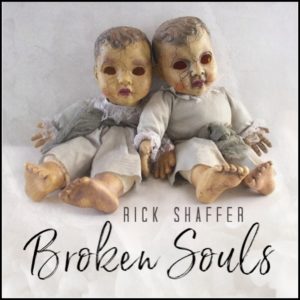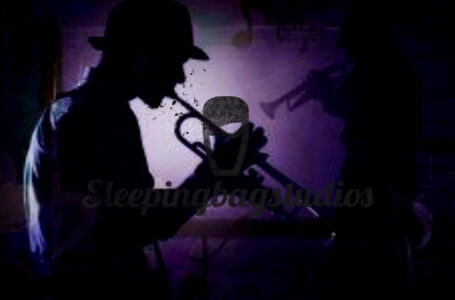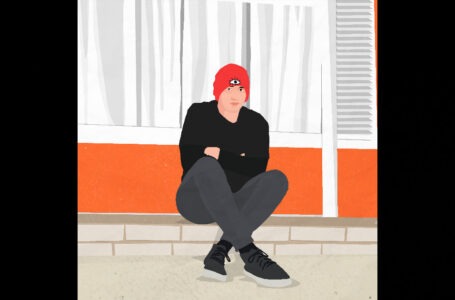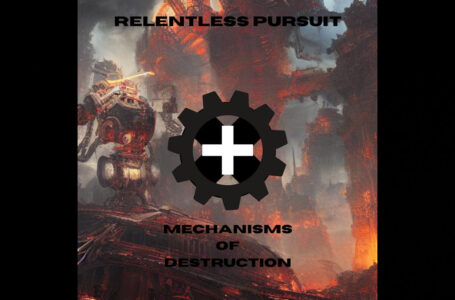Rick Shaffer

Rick Shaffer Interview
SBS: Rick! Long time my brother – welcome back to our pages. I’m stoked to get into talking about the new record Broken Souls, and we’ll get there. Let’s start out by filling in the gaps for us. Last time we heard from ya was when we reviewed your record Creatures Of Impulse at the end of 2018 – I suppose it’s safe to say the world has changed a bit in between then and now. But you wrapped the Creatures Of Impulse album…and then what happens next? How do we get from there to Broken Souls?
Rick: Hi, Jeremy, yes, it’s awhile since we last spoke, and it’s always a pleasure. With the work on Creatures Of Impulse finished I did something I’ve always done by going back to the discipline of writing and working on tones and grooves. I reevaluate the production of the last project and decide where I want the new sounds to go next. The key is finding the voice and consistency in the songs and sounds, for a new album. In 2019 I recorded a new single “High Point,” in Miami, with my partner Bruce Cohen, that’s our first recording together in ten-years as The Reds. It’s been hard to get a Reds project done because of our solo projects and different schedules, but we have been slowly working towards a Reds project that would contain songs and instrumental film music.
SBS: What do you make of all this Covid-19 madness out there Rick? Did the whole pandemic dealio end up affecting anything in the recording process or get in the way of finishing up Broken Souls?
Rick: Sad and frustrated by the sheer incompetence of Government and the human loss worldwide. Everything is always wide open with getting the musicians, engineers and studio time and working in two different worlds between Holly Springs and Detroit, but it’s part of the attraction for me. We had already wrapped the recording and post-production by the end of April 2020, then on to cover art, mastering and video filming, so we were very fortunate overall.
SBS: You ended up with ten tracks in the lineup for the new album – is that the same number you went in with? So many things can happen in the ol’ studio, as I’m sure you well know, songs can discover roadblocks in a recording session they don’t encounter while being played live, new tunes can be created on the fly with extra time. When you’re listening back to the finished masters, what are you personally listening for in the songs that lead to solidifying their spot in the finalized lineup? What does a Rick Shaffer tune have to possess in order for it to satisfy your own standards and end up on a record? I remember the last quote you pulled on me from Joe Meek in our last interview . . . the ‘if it sounds right, it is right’ – and I hear ya on that – but how do you know? What do your ears listen for in your music?
Rick: I like to write 20/25 songs, then get down to 15 to record. Once I start working some songs just don’t work or fit where I’m at at the time. Broken Souls was done over a two-year period with gaps in the studio which gave me a new perspective on the project. I try to have the songs relate to me personally, emotionally, and have an edge/intensity that rocks and pounds like a jukebox. And, if that happens, I know.
SBS: Things came out sounding killer on Broken Souls, as expected Rick! I know you know your way around the studio and your instruments at this point in your career. There’s no title-track to spell it all out for us plainly by summing it all up, so what can you tell us about the name of this record and how it ties into the songs on it? What is Broken Souls all about and what creates the cohesion in the material?
Rick: I think we can all become broken souls for a variety of reasons at different points in our lives, and the album reflects different aspects through relationships, circumstance or just plain “bad luck” or, I’ve been told in the past “bad choices.” The lyrics on the tracks tell the stories as if the whole album was a book. The deeper I got into the album it unfolded itself to me and I found the cohesion.
SBS: With having several records under your belt already dude, I’m wondering how you go about challenging yourself as an artist when you’re heading into a new album and into the studio these days. Is that something that’s still important? Don’t get me wrong, I’d assume it always is to a degree, and I’d imagine there’s still always something to learn as well, but by that same token, I can also imagine it’d be fairly nice to go into a recording knowing you can rely on what’s tried, tested, and true as well. When it comes to Broken Souls, did you find ways to stretch creatively or do something you hadn’t tried before?
Rick: The challenge is always that you’re stepping into a void when you start and, as an artist, you’re never satisfied, but know the balance when to let go. I try to be self evaluating of the writing and arrangement, and check myself trying not to rely on what’s tried and tested and, believe me, it gets painful. I really tried some different ideas on the darker sonic tracks like “Desire Street,” “Closing Time,” and “Like Fire,” the video track, which to me are more atmospheric in nature.
I remember a producer in Philly who worked on the Jerry Lee Lewis track, “Whole Lotta Shaking,” for seven years with tape loops, edits on the two inch master and what it sounded like was surreal, but he couldn’t let it go. A shame it’s a real piece of work. Ultimately as the artist it’s what you value, for me, it’s turning people on, giving them a buzz and maybe something to think about and hope my work has longevity.
SBS: “Love Light” is one hell of an opening cut brother-man, every time I hear those massive drums, the wild personality in the harmonica and vocals, and the main hooks of this first track on Broken Souls come roaring around again, I end up sitting for a whole run through another spin of the entire album. Which is, well, that’s a nice problem to have in my world. This is a serious statement though Rick, “Love Light” sets the standard for Broken Souls, and even after all the rad tunes you’ve created that I’ve personally heard, this still stands out as a huge win for accessibility and rocking a universal vibe to the nth degree. Lots of great cuts on this new album of course, but you went with “Love Light” to start it up, and in my opinion, that’s the perfect call in the context of the lineup of tunes on Broken Souls. Solid choice there, no doubt about it; but how about when it comes to the lead-single – have you selected something to entice the people out there in to listen in that sense? And if “Love Light” makes for a perfect beginning to your new album, what would you say then made “Closing Time” the right ending? I mean, I know it’s called “Closing Time” and implies the end of the album is coming, but was that the intention going in?
Rick: Well, Jeremy, I’m glad you’re digging the “Love Light” sounds. I like albums to start off with a rocker in general and for accessibility it would seem obvious, but in reality, you never know. The first single and video is “Like Fire” and it was selected by Theresa (Marchione, Executive Producer) because of the diversity, hooks and guitar work and how different it is from the other tracks on the album. A rocker would be what’s expected for a video, but her thinking was to explore a different avenue. I suspect at some point we will shoot a video for “Love Light,” so stay tuned.
“Closing Time” as the album closer was my intention once I had all the tracks that would ultimately be on Broken Souls. The concept started when I read a psychology article called, Secrets, and how it could relate in “Closing Time” to the end of the beginning, or beginning of the end of a relationship, or your life itself. Two of the great mysteries of life are Love and Death.
SBS: What would you say was the most important thing you considered during the writing and recording of Broken Souls, and why?
Rick: I wanted the material to draw on the elements of my experiences and music styling’s that have influenced me through the years. My thinking was to get the most diverse group of songs, yet they would have a thread to tell the story. Also, the key was to stay totally in the moment throughout the project.
SBS: Help steer the next generation in the right direction Rick – what’s the secret to recording a killer guitar solo? Is it crucial to go into a recording knowing it note-for-note? Is it about the ability to improv at the time of in a session? A combination of both? Something else entirely? What should guitar players be aware of when it comes to laying down a solo on a permanent recording that’ll last forever?
Rick: I don’t know how much steering is going to get done. My experience with the next generation of players is there’s not a lot of interest in the experience of an older artist, or history of the craft. They seem to work from the theory . . . if it happened before I was born I don’t need to know about it . . . but maybe that will take us somewhere new.
The mainstay for me is tone, phrasing, reckless abandon and playing it like you feel it. Most of the time a run through is always good, but to just improvise is great too, a quick example, when I recorded guitar on Peter Murphy’s “Low Room” the producer, Mike Thorne, brought the track up and I got it on the first take and it remains a favorite track of mine. Doing session work is a great way to work and it also helps to be well prepared. I’m not a note for note guy, let it rip.
SBS: When I was listening to Broken Souls, it occurred to me just how much you’d probably dig this dude over in Australia that goes by the name of Billy Roberts And The Rough Riders – similar Rock flavored vibes shared between ya for sure. During these isolated times we’ve been living in Rick, what music other than your own have you been leanin’ on to get you through and keep you entertained?
Rick: I like Billy Roberts and the Rough Riders work, I dig his vocals and vibe. I don’t listen to my stuff. If I’m doing a radio interview, or hear something on a platform, I end up listening for what could be better production song wise.
I’m all over when it comes to listening, but recently I’ve been listening to Otis Taylor, Leonard Cohen, Julius Daniels, John Prine, King Tubby, Steve Earle and The Dukes, Keith Richards, Fred Mc Dowell, John Hammond, Mississippi Sheiks , Stones, Dylan, Brian Eno, and a Detroit outfit called Protomartyr, because I dig the vocals and these guys are real noise merchants.
SBS: How about one for the technical crowd out there brother? You get some seriously badass tones from those guitars of yours Rick. What’s the key? Is it the set-up, the style, the gear? Tone and texture have always been standout elements of your music in my opinion, and hey man, I get it if you don’t wanna divulge the whole recipe, but maybe you can give us a taste. Is there anything in particular that you find you tend to use throughout your music that gives it the signature sound you rock with?
 Rick: The staple has been finding different guitars, like the sixties German built Framus ones (64 Strato De Luxe, 65 Rivera and 71 Caravelle), that I used along with a 1960 Harmony Stratone Jupiter and Eastwood Saturn 63 on Broken Souls. The sound and vibe of these guitars take you there. The biggest sound development has been the mods on all my amps (1969 Guild Thunderstar, 1958 Premier Twin 8, 1975 Fender Champ and 2000 Vox Cambridge Twin Reverb) by the techs (Jay Keiper and Bill Rusk) at Ant Farm Amplification who worked on every amp understanding my sound and what I’m working towards. The other part is my 60’s Premier Reverberation tank and pedals, related to the Broken Souls album, are a 1965 Vox Tone Bender and 1965 Treble Booster, Foxx Tone Machine, two by Chris Mahoney Guitar Gear Cal Tone and Acid Tone, and two builds by Ant Farm, the Blow Hole and Embargo.
Rick: The staple has been finding different guitars, like the sixties German built Framus ones (64 Strato De Luxe, 65 Rivera and 71 Caravelle), that I used along with a 1960 Harmony Stratone Jupiter and Eastwood Saturn 63 on Broken Souls. The sound and vibe of these guitars take you there. The biggest sound development has been the mods on all my amps (1969 Guild Thunderstar, 1958 Premier Twin 8, 1975 Fender Champ and 2000 Vox Cambridge Twin Reverb) by the techs (Jay Keiper and Bill Rusk) at Ant Farm Amplification who worked on every amp understanding my sound and what I’m working towards. The other part is my 60’s Premier Reverberation tank and pedals, related to the Broken Souls album, are a 1965 Vox Tone Bender and 1965 Treble Booster, Foxx Tone Machine, two by Chris Mahoney Guitar Gear Cal Tone and Acid Tone, and two builds by Ant Farm, the Blow Hole and Embargo.
SBS: You have accomplished so many things throughout your career Rick, and I’m confident you’ll go on to conquer a whole bunch more in these years to come my friend. Looking back on it all now, is there a particular accomplishment or memory that stands out to you as a defining moment of personal success? A moment in time that you can look back on now and think – “Fuck yeah, that’s was why I started doing this whole music thing to begin with,” that kinda thing. Maybe it’s a particular song that you feel is the peak moment of accomplishment, like I mentioned, you’ve done many things – what stands out now?
Rick: I don’t think I’ve reached a peak, but I can say when The Reds, as a duo, released Shake Appeal on Sire and the song “Waiting For You” was licensed for TV’s Miami Vice and the film Band Of The Hand was a particular success. It led to more projects with director, Michael Mann, who’s work we love. What stands out for me now is still being excited and turned on by music, and no matter how bad it gets “the music never lets me down.”
SBS: Some things never change Rick, and that can be a damn comforting thing sometimes wouldn’t ya say? It’s been great to reconnect with you after all this time – and awesome to hear you put another killer record into your catalog my brother. You know how we do it here in these interviews – I’ve got the ol’ ‘open-floor’ warmed up right here for ya, and a soapbox for you to stand on if you wanna shout out any final thoughts at the people out there. All the best to you dude – and thanks again for your time!
Rick: Thanks, to you Jeremy and your readers for keeping the flow of independent music, journalism and ideas going strong. And something I live by, “saying ain’t doing.”
Find out more about Rick Shaffer at the official sites below!
WEBSITE — https://tarockmusic.com/rick-shaffer
FACEBOOK — https://www.facebook.com/TheRedsMusic
TWITTER — https://twitter.com/TarockMusic
SPOTIFY— https://open.spotify.com/artist/2KmiIYkunfSFSJEMczw22q
DOWNLOAD “Like Fire” Free mp3 — https://soundcloud.com/tarockmusic/like-fire-rick-shaffer
We’ve got questions, you’ve got answers – be our next interview guest at sleepingbagstudios by clicking here!






